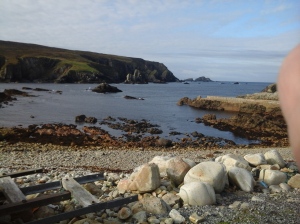
When many hear the world “Ireland,” thoughts of many rise with tedious predictability: border, violence, sexual repression, drunks. Eimear McBride’s new novel, The Lesser Bohemians at once engages and shatters these stereotypes.
McBride uses the modernist style to bring the reader inside the self of her main character, Eily, as the 18-year-old woman crosses her own borders: from childhood to independence; from Ireland to England; from innocence to experience; from loneliness to love. Her language and insight are at times obscure but more often breathtaking, bracing and brilliant. The reader experiences the world of Eily from inside herself, almost as if the reader has become a dissociated personality of the character. McBride captures the essential nature of being young, unschooled, and protected but venturing into a wider world filled with the beauty of unknown art and literature, the challenges of education, and the hazards of sexual innocence. Eily asks herself, when she visits an art gallery “Seek to feel but think instead and wonder if that’s wrong I’m a God’s fair innocent after all when it comes to galleries too.”; and the reader is immediately returned to one’s own initiations. Eily in the initial stage of the novel is searching for her identity:” Why am I. Why am I not. Where’s even the way to could? I’m not lost. Or not lost much. Lonely. It is that and I don’t know what to do.” As she moves through her first months at a London Drama School she acknowledges: “tried by the weight of all I don’t know.”
As she moves through that first year away from Ireland and engages in a relationship with a man whose name is not revealed until well into the novel, a famous actor, more than twice her age, constricting his life, nonetheless, to an untidy bedsit, Eily confronts her own demons: “Thy will be done. Satan under every skin. Skinful under all our skin.” Her sexual initiation begins from a place of fear and shame” To spite myself, for him, To hurt myself. I open my thighs saying Lads, do anything. Nothing matters and it is nothing…Shame fuses to silence letting the night maraud.While like watching TV, I watch. , killing bit by bit the useless hope of not being this girl I was. Am. She is…” And yet, Eily continues the journey of transformation from a shy Irish girl of the 1990’s (“Ireland is what it is. Sealed in itself, like me…”) into a woman who enjoys and even needs sensual and sexual fulfillment: “Strange to my skin, him kissing somewhere else. Stranger to be on the outside, recreating its taste…” Another achievement of McBride in this novel is to write with ferocious clarity about Eily’s emerging sexuality and her pleasure.
McBride moves to a more conventional narrative style, without losing the poetic cadence that appears natural to her, as the novel explores the love story itself. Perhaps, McBride is allowing her prose style to reflect how Eily has moved from her lonely confusion and sense of isolation into the satisfactions and pathos of an actual relationship which must exist or fail to exist on more levels than the purely physical or sensual. Eily is permitted to articulate her own wisdom, “the opposite of love is despair” while retaining her haunting perception. This transition of narrative style creates a less thrilling engagement of the reader but does not diminish the work. Instead, McBride has creatively employed narrative technique to amplify the characters experience.
I received this book from Blogging for Books for this review. Notwithstanding, McBride’s novel remains, to date, my reading highlight of the year.






